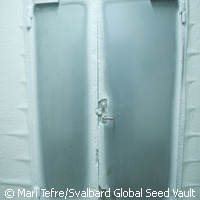Bumper crop for global seed vault
Plugged into place for three years now, the Norwegian-based Svalbard Global Seed Vault (SGSV) has received a bumper crop of seeds, effectively boosting efforts to preserve diverse crop varieties from around the world. Among the new arrivals are rare lima beans, blight-resistant cantaloupe and progenitors of antioxidant-rich red tomatoes. Some of the shipments contain crop varieties that are able to put up a good fight against natural hazards like flood and drought. In a statement, the Italian-based Global Crop Diversity Trust says the new seeds, located in the gigantic vault on the remote Arctic archipelago of Svalbard, include major deposits from genebanks maintained by the Consultative Group on International Agricultural Research (CGIAR), the biggest contributor of seeds to the seed vault, as well soybeans collected by US Department of Agriculture (USDA) experts in China nearly 100 years ago. The USDA shipment also comprises seed collections of Solanum chilense and Solanum galapagense, wild relatives of the tomato whose genetic material was used by breeders at the USDA and the University of California, Davis, to create tomatoes high in lycopene (an antioxidant) and beta-carotene (a source of Vitamin A). Included in another shipment is a Peruvian desert lima bean variety that was threatened with extinction before being saved by the International Center for Tropical Agriculture (CIAT) in Colombia. To date, CIAT has shipped 3,600 bean and forage samples gathered from 94 nations including Afghanistan, Nepal, Vietnam and Zimbabwe. The CGIAR-founded International Center for Agricultural Research in the Dry Areas (ICARDA) in Syria, for its part, is depositing thousands of other bean and cereal varieties. The Ethiopia-based International Livestock Research Institute (ILRI) is also handing over samples of forage crops. It is interesting to note that the Navajo Native American tribe blessed seeds of rare desert legumes from the University of Arizona before they left the US to make their way to Svalbard. CGIAR says the new shipments will expand the vault that currently houses more than 600,000 seeds. 'The optimism generated by the arrival of this incredible bumper crop of contributions is tempered by the threats that seem to emerge almost daily to seed collections around the world,' says Dr Cary Fowler, Executive Director of the Global Crop Diversity Trust, which co-manages the Seed Vault with the Norwegian government and the Nordic Genetic Resources Center in Sweden. 'As the threats to agriculture escalate, the importance of crop diversity grows.' A case in point is the Egyptian crisis that triggered the looting of the Egyptian Desert Gene Bank in North Sinai, a prized collection of fruit and medicinal plants. Looters stole equipment and damaged the facility's cooling system, effectively destroying data that represented over 10 years' worth of research. And the Global Crop Diversity Trust is diligently working to block a planned housing development that would wipe out the field collections at the Pavlovsk Experimental Station in Russia, which represent one of Europe's most important collections of fruits and berries. The organisation is also working to locate and conserve wild relatives of grains like rice, wheat and barley, as well as pulses like lentils and chickpeas. Commenting on the new arrivals in Svalbard, Dr Fowler says: 'As we celebrate the third anniversary of this remarkable vault, it is thrilling to see yet another fantastically diverse shipment of seeds arrive. The scale of the challenges facing agriculture can be overwhelming, yet the knowledge that over 600,000 samples are now guaranteed to be safe and available to help farmers gives me great hope for our common future.'For more information, please visit: Global Crop Diversity Trust:http://www.croptrust.org/main/Svalbard Global Seed Vault: http://seedvault.no
Countries
Afghanistan, Egypt, Italy, Norway, Nepal, Peru, Russia, Sweden, United States, Viet Nam, Zimbabwe



